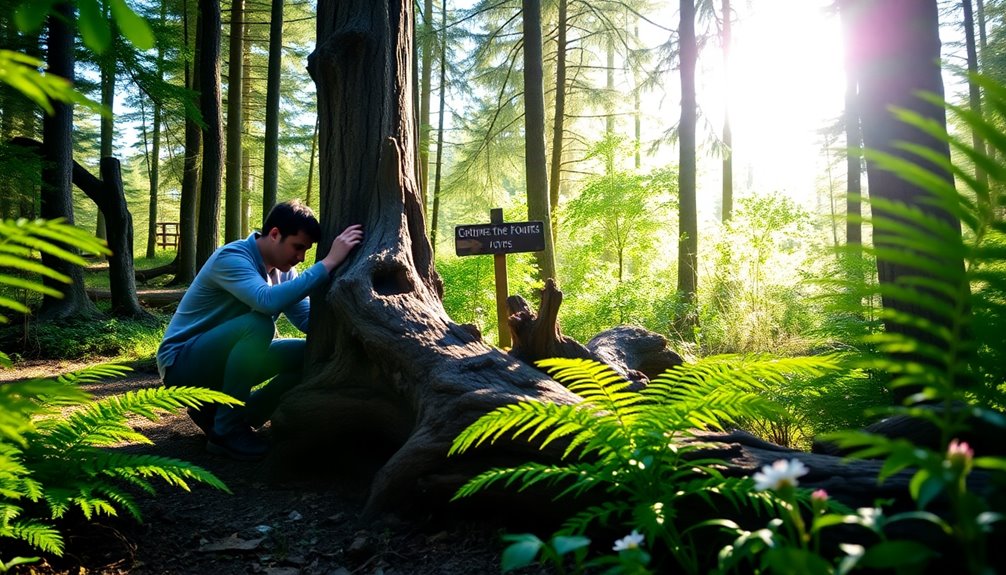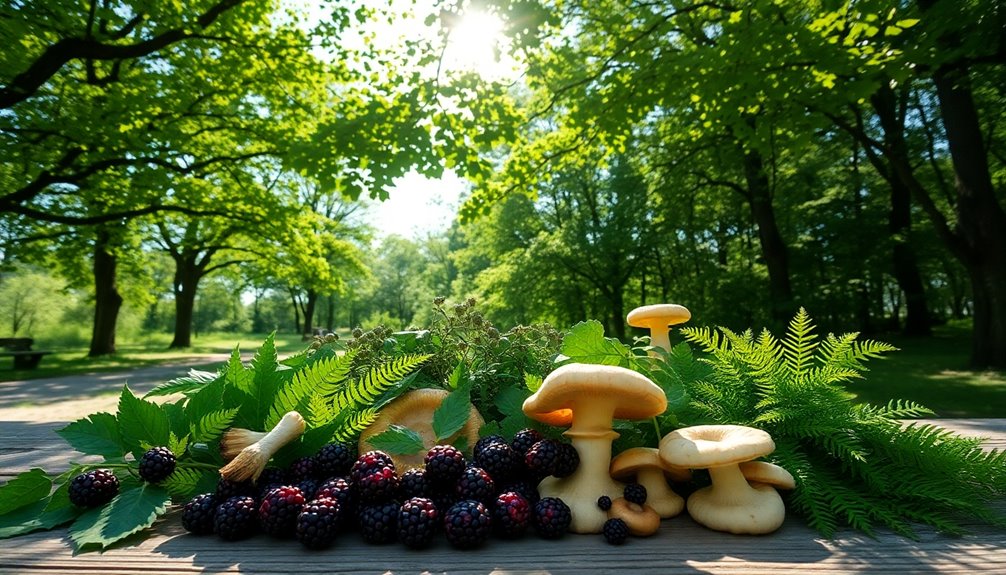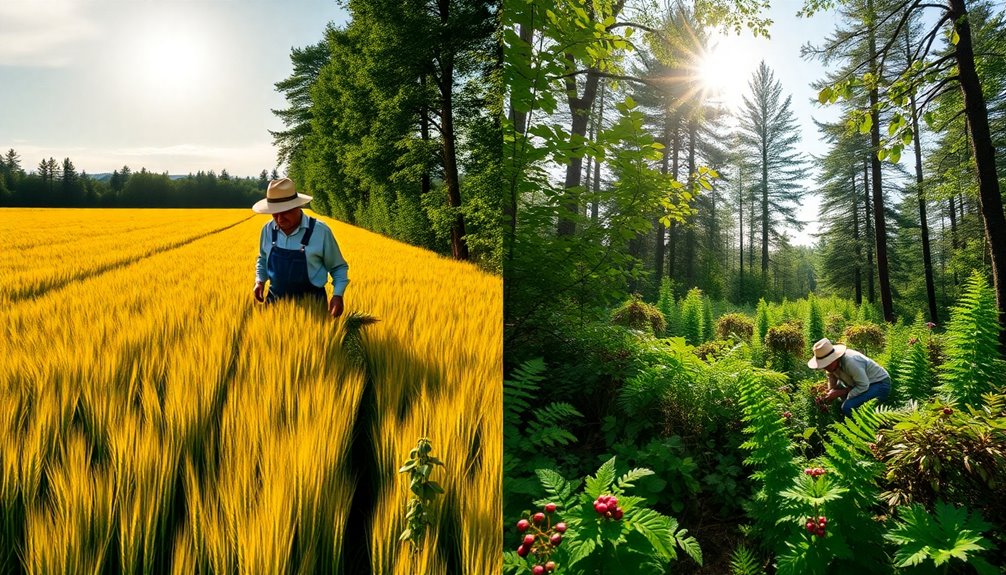Foraging for wood isn't simply a fun activity; it often crosses legal boundaries you might not be aware of. Most wood belongs to landowners, so taking it without permission can be considered theft, resulting in fines. Some areas, like Epping Forest, allow limited collection under specific rules, but many local councils enforce strict regulations. It's essential to check laws before collecting anything. Ignoring these guidelines may lead to unexpected consequences for both you and the ecosystem. To navigate these complexities and enhance your foraging experience, there's much more to explore regarding ethical practices and community perspectives.
Key Takeaways
- Unauthorized wood collection is typically considered theft, leading to potential fines and legal repercussions for foragers.
- Local councils may have specific regulations on wood collection, including seasonal restrictions and limits on quantity.
- Epping Forest allows collection of up to 12 kg of fallen wood daily, but only under certain conditions.
- Ethical foraging practices emphasize taking only what is necessary and ensuring minimal impact on local ecosystems.
- Understanding local customs and legal rights is essential to navigate the complexities of wood foraging responsibly.
Understanding Wood Foraging Laws
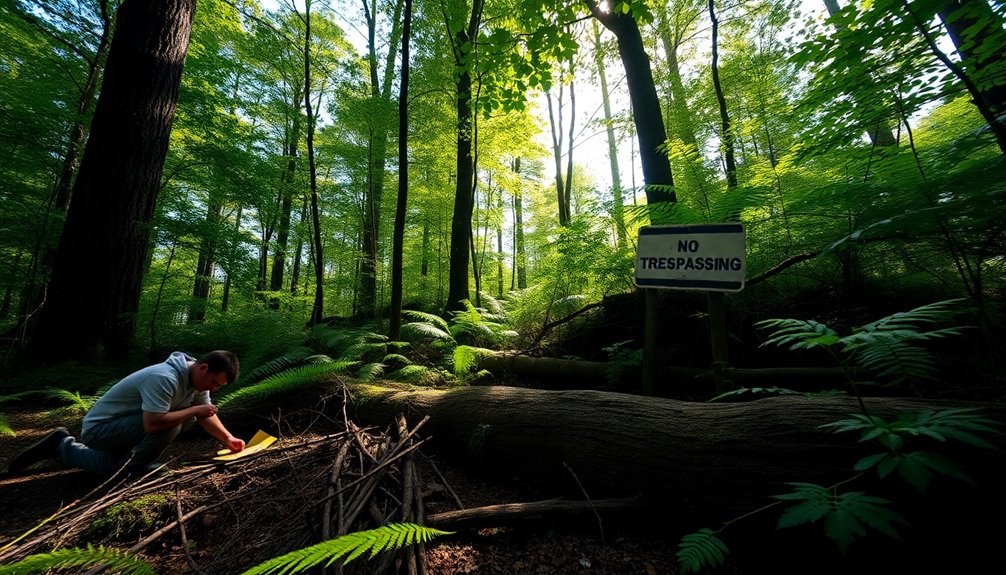
When it comes to foraging for wood, you've got to navigate some tricky legal waters. In most cases, you don't have a legal right to collect fallen wood without the owner's permission, as all wood typically belongs to whoever owns the land. Unauthorized collection can be classified as theft, and landowners can pursue legal action against you, leading to fines or other penalties.
If you're considering foraging for wild wood, it's essential to ask permission first, especially on private property. Laws can vary greatly by jurisdiction; therefore, it's important to check local councils' regulations, as they often have their own policies on what can be collected.
In some rare cases, like Epping Forest, you may have specific rights to collect up to 12 kg of fallen wood daily, but there are size restrictions.
Always be aware of seasonal and environmental conditions to guarantee responsible foraging practices. Remember, it's better to be informed and respectful of the rules than to face potential legal consequences while searching for that perfect piece of wood.
Historical Context of Wood Collection
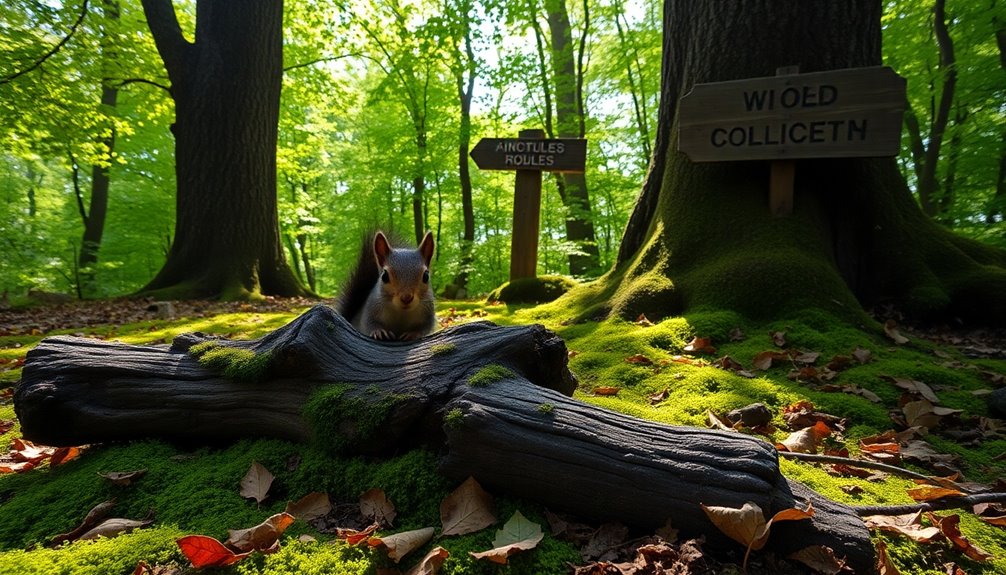
Historically, the collection of wood has been closely tied to issues of land ownership and property rights, shaping the legal landscape we navigate today. Many people hold historical misconceptions about their legal right to collect wood, often believing they can freely gather fallen timber due to the Magna Carta. However, that document doesn't explicitly grant such rights.
Understanding the legal framework is essential, as it varies across jurisdictions. Here are four key points to take into account:
- The legal right to collect firewood in England generally doesn't exist; all wood belongs to the tree's owner.
- Unauthorized collection is considered theft, resulting in fines or legal action from property owners.
- Specific rights exist in places like Epping Forest, allowing the collection of up to 12 kg of dead or driftwood daily under strict conditions.
- Historical debates about property rights and land ownership continue to influence modern laws regarding wood collection.
Recognizing these nuances helps you navigate the often murky waters of wood collection legality and guarantees you respect both property rights and local regulations.
Ethical Considerations in Foraging
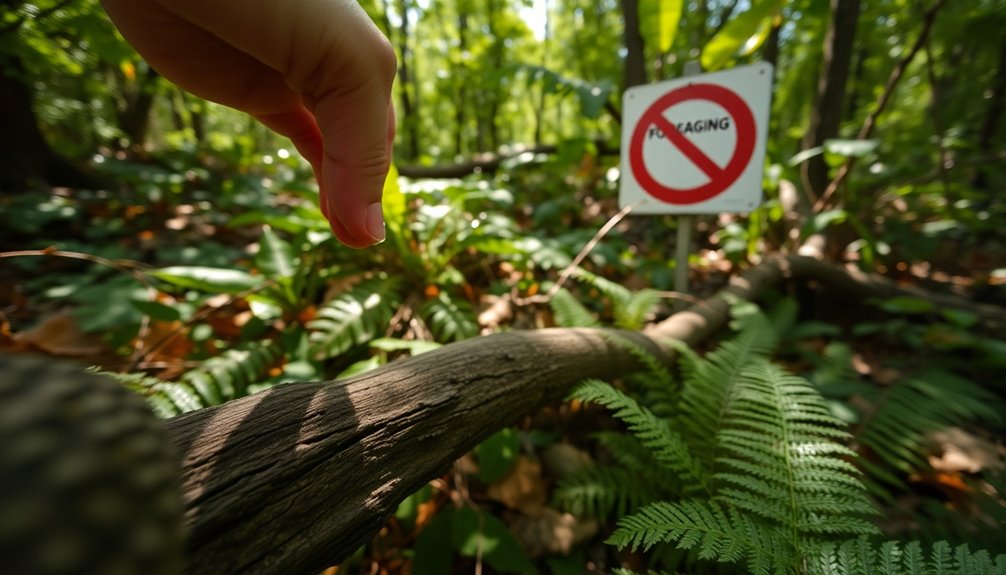
Understanding the legal framework around wood collection is just the beginning; ethical considerations play a significant role in how you should approach foraging.
Ethical foraging emphasizes taking only what you need, ensuring you don't harvest more than one-third of a plant. This practice helps preserve ecosystems and allows for the continued enjoyment of natural resources.
When foraging, you must respect the rights of landowners. Collecting wood without permission can lead to legal consequences and is often viewed as unethical.
On federal land, there are different rules, so familiarize yourself with local regulations.
Responsible foraging practices require awareness of the ecological impact. For instance, removing deadwood can disrupt nutrient recycling and the habitats of various species.
Engaging in foraging fosters stewardship for natural resources, reminding you to respect and protect local ecosystems.
Community Perspectives on Wood Gathering
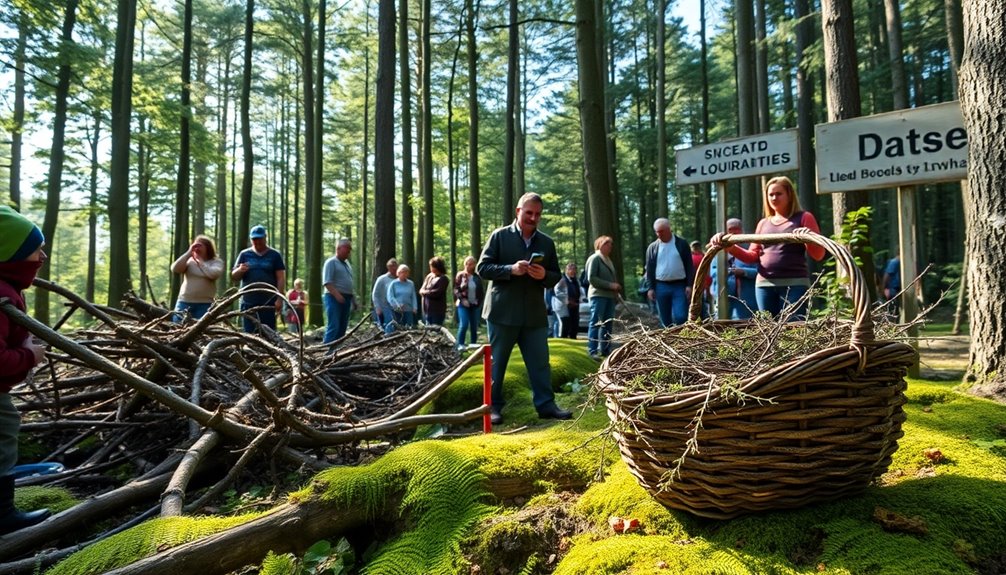
When you think about wood gathering in your community, it's clear that local customs play a big role in shaping attitudes.
Many folks believe they've the right to collect fallen wood, but this often clashes with ethical considerations and land ownership.
Understanding these community norms can help you navigate the complexities of wood gathering responsibly.
Local Customs and Norms
While many people believe they've a right to collect fallen wood, community perspectives on this practice often reveal a complex interplay of local customs and legal restrictions.
You might find that in some areas, like Epping Forest, local customs actually permit gathering small amounts of deadwood—like up to 12 kg daily—under specific conditions.
However, there's a stark contrast between these allowances and broader legal restrictions that can lead to misunderstandings.
Consider these points to better navigate community norms around wood gathering:
- Public Right vs. Private Property: Many believe collecting fallen branches is a public right, but this varies greatly by location.
- Cultural Acceptance: Some communities may accept unauthorized collection for personal use, creating a gray area in the rules for foraging.
- Shared Experiences: Local discussions often shape community perspectives, highlighting personal needs against property rights.
- Legal Awareness: Misunderstandings about what's legally permissible can lead to tensions, making it essential to stay informed.
Understanding these dynamics can help you respect both local customs and regulations while foraging responsibly.
Ethical Considerations in Gathering
Many communities have nuanced views on the ethics of gathering wood, often shaped by a blend of local customs and personal beliefs. While some individuals feel entitled to collect fallen wood, it's important to recognize the ethical considerations at play.
Taking wood from private land without permission is generally viewed as theft, undermining respect for property rights. Local customs can complicate these perspectives, leading to misunderstandings about what's acceptable.
However, it's significant to remember that removing wood can disrupt local ecosystems, emphasizing the need for sustainable practices. You should consider how your actions affect the environment and the community as a whole.
Engaging in discussions about wood gathering ethics helps foster community awareness and respect for both individual needs and landowner rights. By sharing knowledge and experiences, you can promote responsible behavior that honors local customs while protecting essential resources.
Ultimately, respecting property rights and adopting sustainable practices guarantees that wood gathering can continue to be a viable option for everyone involved.
Practical Tips for Collectors
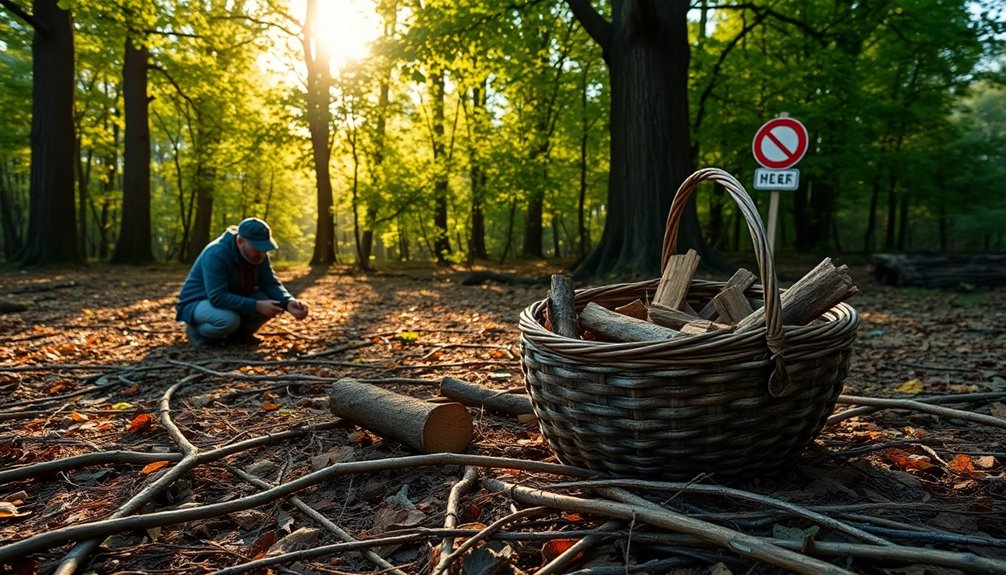
Before you head out to collect wood, it's vital to check land ownership and get permission from landowners, as unauthorized gathering can lead to legal trouble. Knowing the local regulations is important, so here are some practical tips to help you collect responsibly:
- Research Local Council Policies: Understand the specific rules regarding wood collection in your area. Some councils may allow collecting abandoned wood under certain conditions.
- Seek Permission: Always ask landowners for permission before collecting. This protects you from accusations of theft and fosters good relationships with the community.
- Know the Limits: In places like Epping Forest, you can collect up to 12 kg of dead or driftwood daily, but be aware of size restrictions. Always adhere to local regulations.
- Be Mindful of Overharvesting: Engage with local conservation efforts. Overharvesting can lead to ecological damage, so collect with biodiversity in mind, ensuring the sustainability of resources for future collectors.
Navigating Public and Private Lands
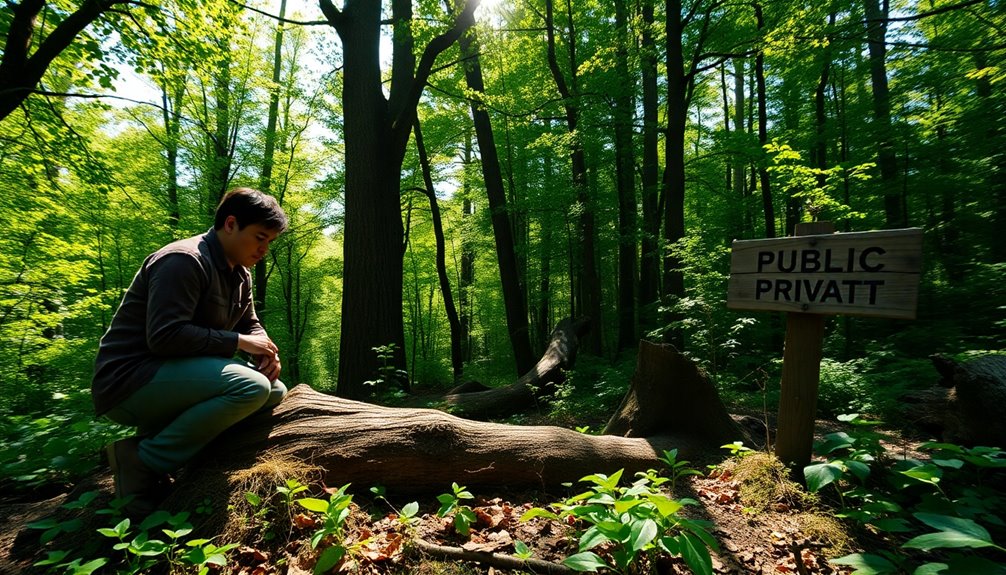
When foraging for wood, understanding the distinction between public and private lands is vital to avoiding legal pitfalls. On public lands, you often need specific permits for foraging, as regulations vary widely depending on the location and type of land. Some areas may allow limited harvesting without a permit, but always check local laws.
When it comes to private property, it's essential to seek permission from the landowners before collecting anything. Unauthorized foraging can lead to theft charges, which you definitely want to avoid. Right-of-ways might seem like an easy option, but be cautious; local regulations often impose restrictions on what you can collect there.
Make certain you're aware of any seasonal restrictions and specific items that may be illegal to possess. While collecting trash on public land is usually acceptable, it may still require permission, especially if you're in a sensitive environmental area.
Sustainable Foraging Practices
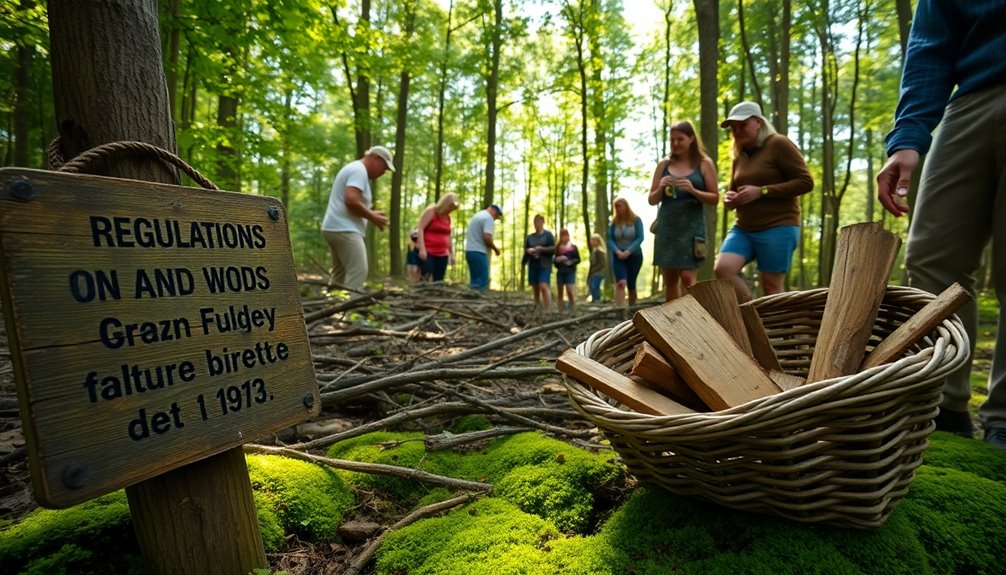
Sustainable foraging practices are vital for preserving natural ecosystems while enjoying the bounty they offer. When you forage, it's important to be mindful of your impact. Here are some key points to guide you:
- Harvest Responsibly: Only take what you need and limit your collection to one-third of a plant to promote its regrowth and maintain ecological balance.
- Follow Local Regulations: Always familiarize yourself with local laws regarding foraging. This helps prevent legal issues and guarantees that you're foraging ethically.
- Consider Biodiversity: Be aware of how your actions affect local ecosystems. Overharvesting can threaten biodiversity and the health of various species.
- Engage in Community Learning: Utilize foraging education resources and connect with others to share knowledge. This fosters respect for ecosystems and supports conservation efforts.
Frequently Asked Questions
Is Foraging Illegal in the US?
Foraging isn't inherently illegal in the U.S., but the rules vary by state and location.
You might find some areas, like city parks in New York, where foraging is completely prohibited.
On the other hand, states like Alaska and Hawaii often allow it.
Always check local regulations before you start foraging, as ignorance of the law won't protect you from potential fines or penalties for picking plants in restricted areas.
Is Forage Legal on Public Land?
When you're considering foraging on public land, it's essential to know the rules.
Many areas prohibit the collection of natural materials, including wood, without proper permits. Some federal lands might allow it under specific conditions, but you'll need to check local regulations first.
Always consult park guidelines or speak with a ranger to guarantee you're not breaking any laws. It's better to be safe and informed before you start foraging.
How Do You Forage Legally?
To forage legally, start by researching local regulations.
Check if you need permission from landowners or specific permits for public lands. Some areas allow collecting small amounts of dead or driftwood, while others may prohibit any harvesting.
Always respect property boundaries and adhere to seasonal restrictions. If you're unsure, ask local authorities for guidance.
Staying informed will help you enjoy foraging while avoiding any legal troubles or fines.
What Is the Golden Rule of Foraging?
Did you know that over 1 million species are at risk due to unsustainable foraging practices?
The golden rule of foraging is simple: take only what you need, ideally no more than one-third of a plant. This guarantees it can continue to thrive.
Always express gratitude and seek permission from the plant or land.
Be mindful of your surroundings, and don't rush into harvesting the first specimen you see.
Respect nature, and it'll reward you.
Conclusion
So, before you head out with your saw and dreams of a cozy fire, consider the rules that might surprise you. Are you trespassing on private land? Is that fallen branch up for grabs? The thrill of foraging can quickly turn into a legal headache if you're not careful. Stay informed, respect the land, and you'll guarantee your next wood-gathering adventure is both exciting and lawful. What will you discover—or inadvertently risk—on your next outing?

